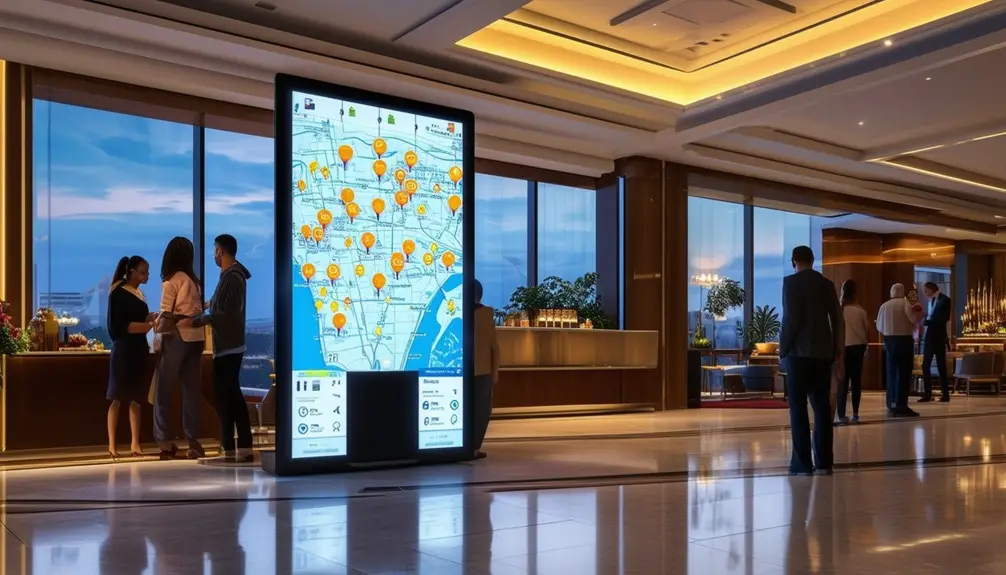Enhance your hotel’s efficiency and guest satisfaction with interactive information kiosks. Streamline check-in and check-out processes while providing real-time updates on amenities and local events. These kiosks offer secure identity verification through biometrics and multiple payment methods, ensuring a seamless experience. They help reduce staffing costs and can even boost revenue by promoting upgrades and services. Additionally, they provide multilingual support to cater to international guests. With robust security features and compliance with standards, they maintain high levels of trust and data protection. Discover how these innovations can give your hotel a competitive edge.
Key Takeaways
- Enhance guest convenience with quick check-in/out and instant access to hotel services.
- Provide multilingual support for international guests, ensuring seamless interactions.
- Offer real-time updates on room availability, events, and promotions.
- Utilize AI-based identification for secure authentication and fraud prevention.
- Promote hotel amenities and local attractions to increase revenue and guest engagement.
History of Interactive Kiosks
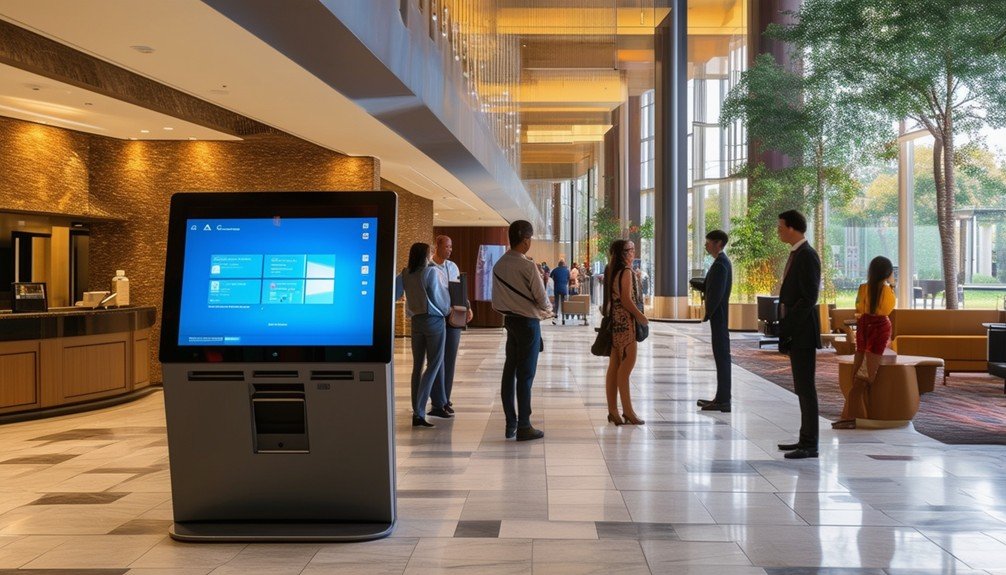
In 1977, the University of Illinois introduced the first interactive kiosk, revolutionizing how users access information. This technological milestone laid the groundwork for the widespread adoption of interactive kiosks that you see today, especially within the hospitality industry. As a hotel guest, you benefit from these information kiosks by quickly accessing essential details like check-in procedures, local attractions, and dining options without needing staff assistance.
The journey from that initial prototype to the sophisticated self-service kiosks in hotels today is fascinating. By 1985, Florsheim Shoe Co. had established a commercial kiosk network, proving the viability of these systems in retail settings. Fast forward to 1991, and Comdex showcased the first internet-connected commercial kiosk, expanding the possibilities for real-time information retrieval.
In 1995, Los Alamos National Laboratory introduced a detailed interactive kiosk, pushing the envelope further in user engagement and data interaction. The importance of self-service kiosks grew so evident that KioskCom was launched in 1997, dedicated to promoting their development and integration across various industries.
Understanding this history not only highlights the technological advancements but also underscores the growing importance of user-centric design in enhancing the guest experience in hotels.
Design and Construction
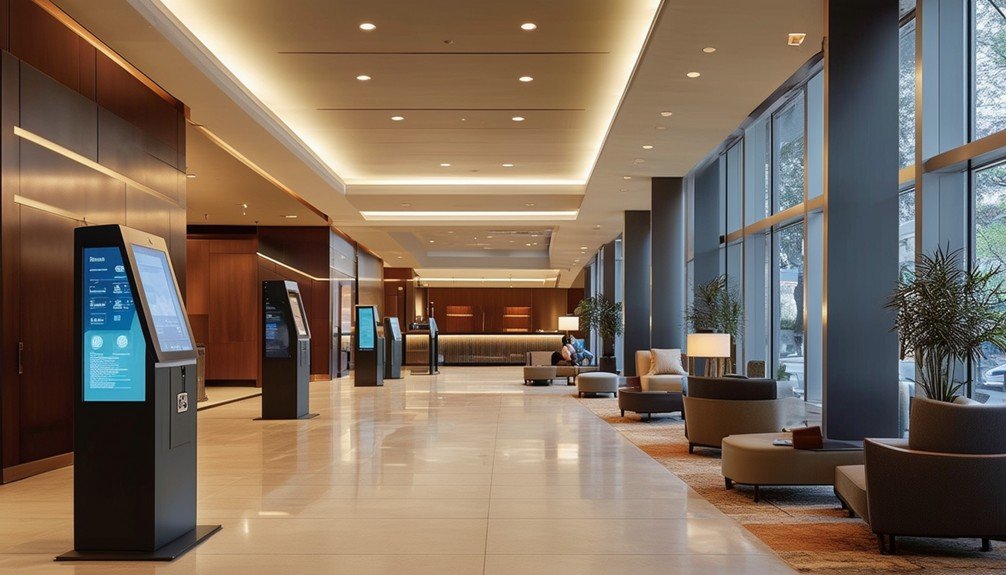
Designing and constructing hotel guest interactive information kiosks necessitates meticulous attention to both aesthetic appeal and functional efficiency, guaranteeing a seamless user experience. You need to prioritize an appealing design to encourage user adoption. Aesthetics are not just about looks; they also involve intuitive layouts and compelling graphic messaging that clearly communicate with guests.
When it comes to construction, you can’t overlook the impact of manufacturing volume. High manufacturing volumes can lower costs but require streamlined production processes. Make certain that your construction meets regulatory standards like ADA, UL, CE, and PCI to avoid compliance issues and enhance user safety.
Kiosk software is another critical element. The software should be user-friendly, offering interactive functions that cater to guest needs, such as check-in, local information, and amenities booking. A well-designed software interface is as crucial as the physical design, enhancing the overall user experience.
Incorporate feedback loops during the design and construction phases to secure that your kiosks meet the highest standards of functionality and aesthetics. This approach guarantees that the final product not only looks good but also performs reliably, offering a superior experience for hotel guests.
Global Usage and Applications
Interactive information kiosks have revolutionized the way businesses across the globe provide services, offering unparalleled convenience and efficiency to both customers and operations. These self-service solutions are transforming industries by enhancing the guest experience and acting as digital concierges in various settings.
In the US and Canada alone, over 1,200,000 kiosks are deployed in diverse sectors such as postal services, healthcare, and transportation. Major companies like Delta, United Airlines, and Walmart have integrated interactive kiosks to streamline their operations and elevate customer service. For instance, at airports, these kiosks facilitate quick check-ins and boarding passes, reducing wait times and increasing passenger satisfaction.
Globally, interactive kiosks are just as impactful:
- India: Digital kiosks simplify bill payments, showcasing their versatility.
- UK: Job-seekers benefit from kiosks that provide employment information and applications.
- US: Homeland Security uses immigration kiosks to expedite entry processes.
In the hospitality industry, these kiosks serve as digital concierges, offering guests instant access to hotel services, local attractions, and more. By providing real-time information and streamlining processes, interactive kiosks significantly improve the overall guest experience and operational efficiency in hotels worldwide.
Government and Industry Adoption
Governments and industries worldwide are rapidly adopting interactive kiosks to streamline services and enhance user experience. Over 1,200,000 interactive kiosk terminals are deployed across the US and Canada, showcasing the widespread industry adoption. These digital kiosks are revolutionizing sectors like postal services and the Veterans Administration, providing improved customer service and operational efficiency.
In the government sector, interactive kiosks are indispensable tools. The UK leverages these kiosks for job-seeking services, while the US Homeland Security uses them for immigration processes. India is also embracing digital kiosks for bill payments, highlighting a global trend in government adoption.
Major companies like Delta Airlines, United Airlines, and Walmart demonstrate significant industry adoption. These organizations use interactive kiosks to guarantee seamless customer interactions and efficient service delivery.
Here’s a quick look at some examples of government and industry adoption:
| Sector | Region | Use Case |
|---|---|---|
| Job-Seeking | UK | Employment services |
| Homeland Security | US | Immigration services |
| Postal Services | US | Customer convenience |
| Veterans Administration | US | Self-service solutions |
| Bill Payments | India | Digital transactions |
Technology and Innovation
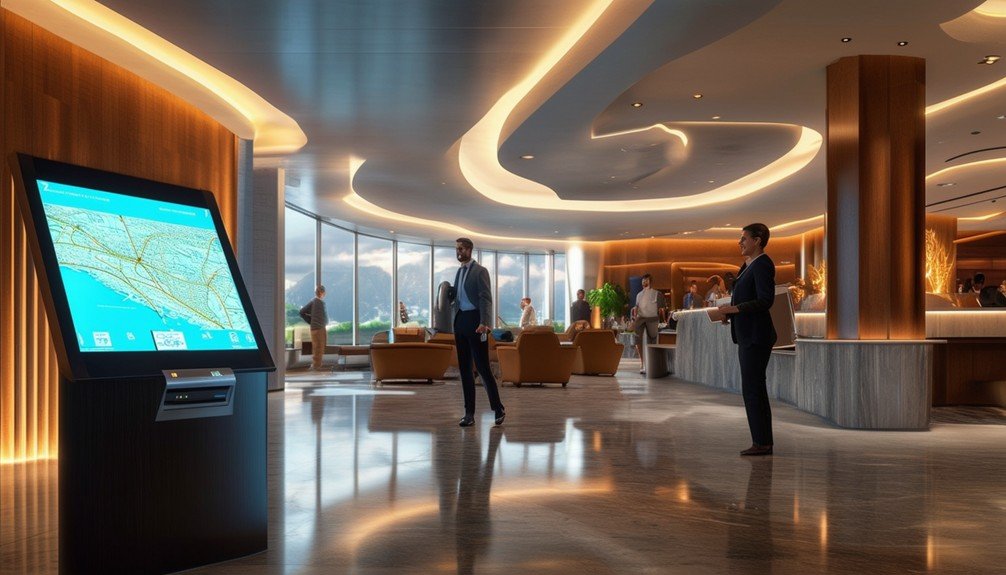
You’ll find that hotel guest interactive kiosks are pushing the boundaries with their advanced interfaces, offering intuitive navigation and real-time data integration. These technologies guarantee that you receive instant updates and personalized services, enhancing your overall experience. By leveraging cutting-edge innovations, hotels can provide a seamless, efficient, and highly responsive guest interaction.
Advanced Interactive Interfaces
When staying at a hotel, you’ll notice how advanced interactive interfaces in guest information kiosks seamlessly integrate cutting-edge technology to enhance your overall experience. These interactive interfaces offer AI-based identification for secure authentication, ensuring that sensitive transactions are handled safely. You can enjoy seamless check-out processes with detailed billing options, making your departure stress-free.
The intuitive interfaces support multiple languages and loyalty programs, catering to diverse guest needs. Personalized recommendations are provided based on your preferences, making your stay more enjoyable and tailored. The kiosks are designed to match the hotel’s branding, ensuring a cohesive aesthetic that enhances your experience.
Key features you’ll find include:
- AI-based identification: Secure authentication for safe transactions.
- Seamless check-out processes: Detailed billing options for stress-free departures.
- Personalized recommendations: Tailored suggestions to enhance your stay.
These advanced interfaces are not just functional but user-centric, offering automated identity verification and payment acceptance. You’ll also find interactive maps for easy navigation around the hotel and nearby attractions. With these technological advancements, your stay becomes more convenient, personalized, and secure, reflecting the latest industry insights in hospitality technology.
Real-Time Data Integration
Immediate data integration in hotel guest interactive kiosks guarantees instant updates on room availability and event schedules, enhancing your overall convenience and satisfaction. By leveraging this advanced technology, hotels ensure that the information displayed on their kiosks is always accurate and current. This means you can depend on these interactive kiosks to provide real-time information on available amenities, services, and facility status.
The integration of instant data into hotel kiosks plays a vital role in elevating guest satisfaction. Whether you’re checking for an open slot at the spa or looking for the latest updates on hotel events, these kiosks deliver the information you need instantly. This immediacy not only enhances guest convenience but also contributes to a more seamless and efficient guest experience.
Additionally, real-time data integration helps hotels manage their resources more effectively. When information on room availability and event schedules is updated instantly, it minimizes the risk of overbooking and ensures that you receive the best possible service. To sum up, interactive kiosks with immediate data integration are a game-changer in the hospitality industry, providing you with a reliable, up-to-date, and efficient way to enhance your stay.
Hotel Check-In Solutions
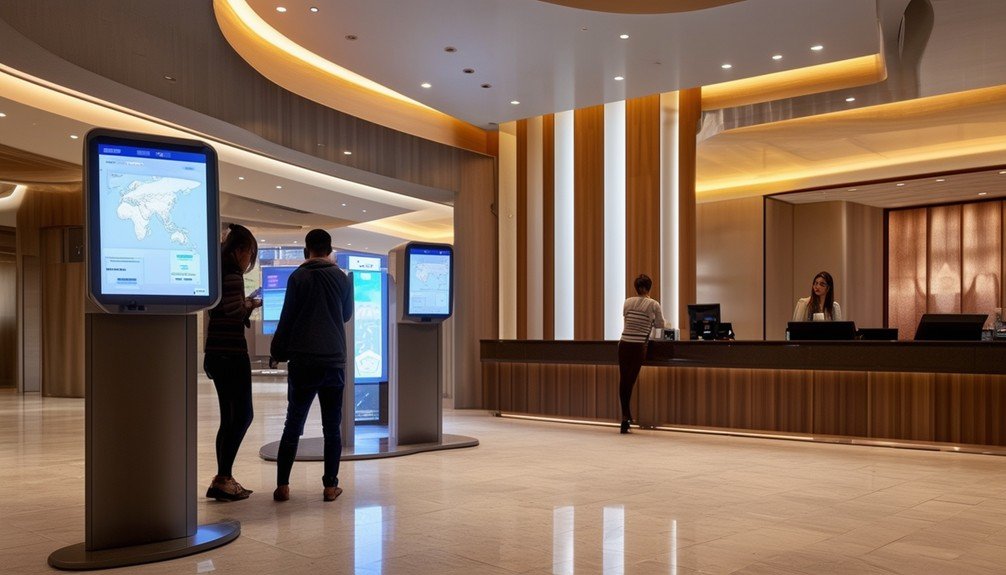
When you use Meridian’s hotel check-in kiosks, you’ll experience a streamlined self-service process that saves time and reduces hassle. These kiosks guarantee secure identity verification, giving you peace of mind while checking in. By integrating these advanced solutions, hotels can enhance efficiency and improve guest satisfaction.
Streamlined Self-Service Process
In today’s fast-paced hospitality industry, Meridian’s hotel check-in kiosks revolutionize the guest experience by offering a streamlined and secure self-service check-in process. These self-service kiosks allow you to bypass traditional front desk queues, saving valuable time. The streamlined check-in process guarantees you can effortlessly complete forms and settle payments using secure payment methods.
Meridian’s interactive digital signage serves a dual purpose. Not only does it provide essential information promptly, but it also acts as a potent tool for revenue generation. Hotels can leverage these digital displays to promote on-site amenities, local attractions, and special events, enhancing your overall stay while boosting the hotel’s revenue.
Here are a few key advantages of using Meridian’s hotel check-in kiosks:
- Efficiency: Quickly complete your check-in process without waiting in line.
- Convenience: Access up-to-date information on hotel services and local events.
- Security: Conduct transactions using secure payment methods, safeguarding your financial data.
Secure Identity Verification
Meridian’s hotel check-in kiosks ensure secure identity validation by utilizing advanced authentication technologies, enhancing both guest trust and operational efficiency. When you approach the kiosk, it quickly verifies your identity through biometric scans or official ID documents. This guarantees that only authorized guests proceed with check-in, providing peace of mind and reducing the risk of fraud.
These kiosks do more than just check you in. They streamline guest room check-out, allowing you to settle your bill using various payment methods, such as cash, credit cards, or debit cards. Additionally, you can complete the necessary forms and make room payments securely right at the kiosk, avoiding the hassle of paperwork.
| Feature | Description | Benefit |
|---|---|---|
| Secure Identity Validation | Biometric scans or ID document checks | Reduces fraud, enhances trust |
| Guest Room Check-Out | Quick and easy bill settlement | Saves time, improves efficiency |
| Payment Methods | Accepts cash, credit, and debit cards | Flexible payment options |
| Forms Completion | Digital form submission | Streamlines administrative tasks |
| Key Retrieval | Automated key dispensing | Simplifies access to rooms |
With Meridian’s kiosks, the entire check-in process, from secure identity validation to key retrieval, becomes seamless. This not only shortens wait times but also greatly enhances guest satisfaction.
Security and Compliance
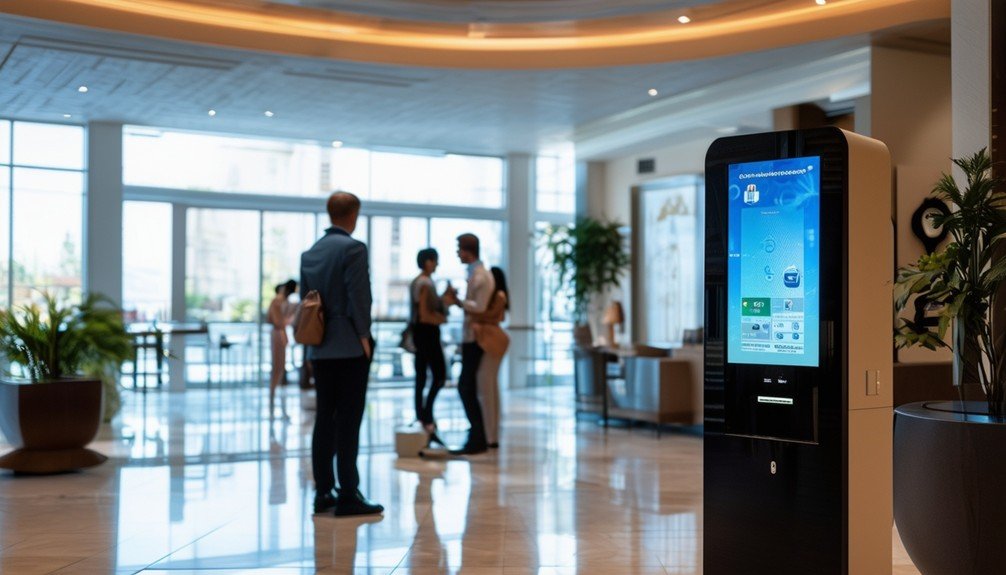
Securing payment processing and complying with data security regulations is vital for hotel interactive information kiosks to build trust with guests. You need to prioritize secure payment processing to safeguard customer data and maintain their confidence. Implementing robust data security regulations is essential, and multi-factor authentication adds an extra layer of protection. Regular staff training on security protocols ensures that everyone is up-to-date on the latest practices, helping to prevent breaches.
Monitoring for suspicious activities is another crucial component. By keeping a vigilant eye on potential threats, you can quickly detect and mitigate any risks to guest information. Here are some essential practices:
- Regular Security Audits: Conduct frequent audits to identify and address vulnerabilities.
- Encryption: Use strong encryption methods to protect sensitive data during transmission and storage.
- Multi-Factor Authentication: Implement multi-factor authentication to add an additional layer of security for user access.
Financial and Operational Benefits
Adopting hotel guest interactive information kiosks can decrease staffing costs while enhancing thorough operational efficiency. By minimizing the need for additional front desk personnel, these kiosks lead to long-term cost savings. You can dynamically reallocate your workforce to other essential services, thereby optimizing overall hotel operations.
Interactive kiosks provide significant financial benefits by creating upselling opportunities. Guests can easily access information about premium services, room upgrades, and special offers directly through the kiosks, leading to increased revenue streams. Additionally, customizable solutions allow you to choose kiosks that fit your budget constraints without compromising functionality.
The streamlined processes these kiosks offer further improve operational efficiency. Guests can perform self-check-ins and check-outs, reducing wait times and enhancing the overall flow of hotel operations. The integration of advanced security features ensures safe and reliable transactions, giving you peace of mind while maintaining high operational standards.
By investing in interactive kiosks, you free up valuable resources that can be allocated to elevating other aspects of your service. This all-encompassing approach not only boosts operational efficiency but also positions your hotel for sustained financial health and growth.
Enhancing Guest Satisfaction
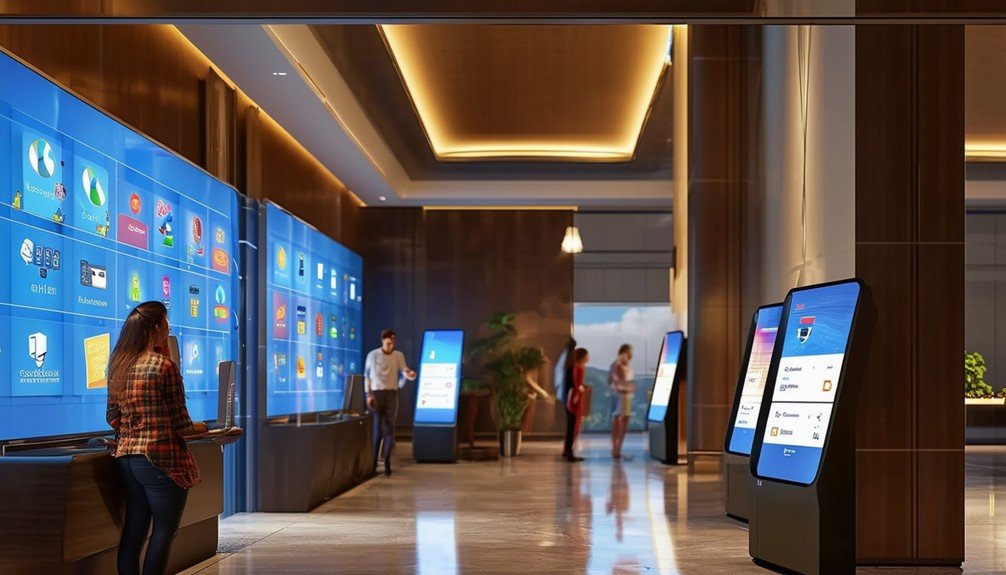
Implementing hotel guest interactive information kiosks markedly boosts guest satisfaction by offering instant access to essential information and services. These kiosks provide a seamless and convenient experience, allowing guests to effortlessly find details about local attractions, hotel amenities, and more.
With multilingual support, the interactive digital kiosk caters to diverse international travelers, breaking language barriers and ensuring a smooth interaction for everyone. Real-time updates on events, room availability, and promotions keep guests informed and engaged throughout their stay, enhancing their overall experience. Additionally, the availability of emergency information, such as exit routes and contact details, substantially contributes to guests’ safety and peace of mind.
By investing in these kiosks, you’re not just enhancing convenience but also fostering guest loyalty. Guests appreciate the personalized and efficient service, which can lead to repeat visits and positive reviews. Here are some immediate benefits:
- Instant Access: Quick and easy access to local attractions and hotel amenities.
- Multilingual Support: Cater to a diverse range of international guests.
- Real-Time Updates: Stay informed about events, promotions, and emergency information.
In essence, leveraging interactive digital kiosks can transform the guest experience, driving higher satisfaction and loyalty.
Conclusion
Think of interactive information kiosks in hotels as the Swiss Army knife of guest services. They streamline check-ins, enhance security, and boost operational efficiency. By adopting this technology, hotels aren’t just keeping up with industry trends—they’re setting new standards. You’ll find these kiosks are invaluable in improving guest satisfaction and driving financial benefits. Embrace this evolution, and you’ll transform your operations into a seamless, guest-centric experience that stands out in the competitive hospitality landscape.
Frequently Asked Questions
What Is an Interactive Kiosk?
You’re looking at an interactive kiosk, which is a self-service terminal with a touchscreen that lets you access information, perform transactions, and complete tasks independently. It’s designed to enhance user experience through intuitive interfaces and multimedia capabilities.
How Do Hotel Kiosks Work?
Hotel kiosks work by offering you interactive touchscreens for seamless self-check-in, room selection, key retrieval, and payment processing. They reduce wait times, provide multilingual support, real-time updates, and enhance your overall convenience and satisfaction.
What Are the Disadvantages of Mobile Check-In?
You may think mobile check-in is convenient, but it can suffer from connectivity issues, lack personalized service, pose security risks, offer limited functionality, and not all guests are comfortable with the technology, impacting overall experience.
What Is a Digital Information Kiosk?
A digital information kiosk is a self-service terminal offering interactive access to maps, event schedules, local attractions, and more. You can check in/out, select rooms, pay bills, and get personalized recommendations, enhancing your overall experience.

